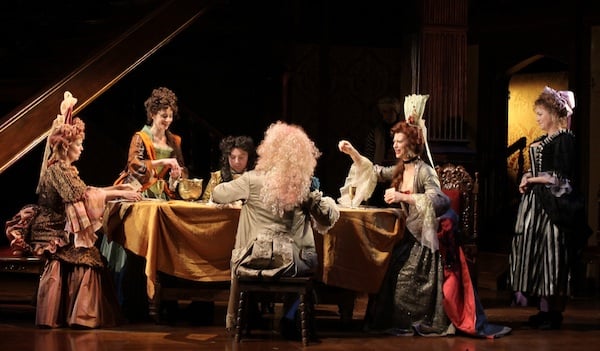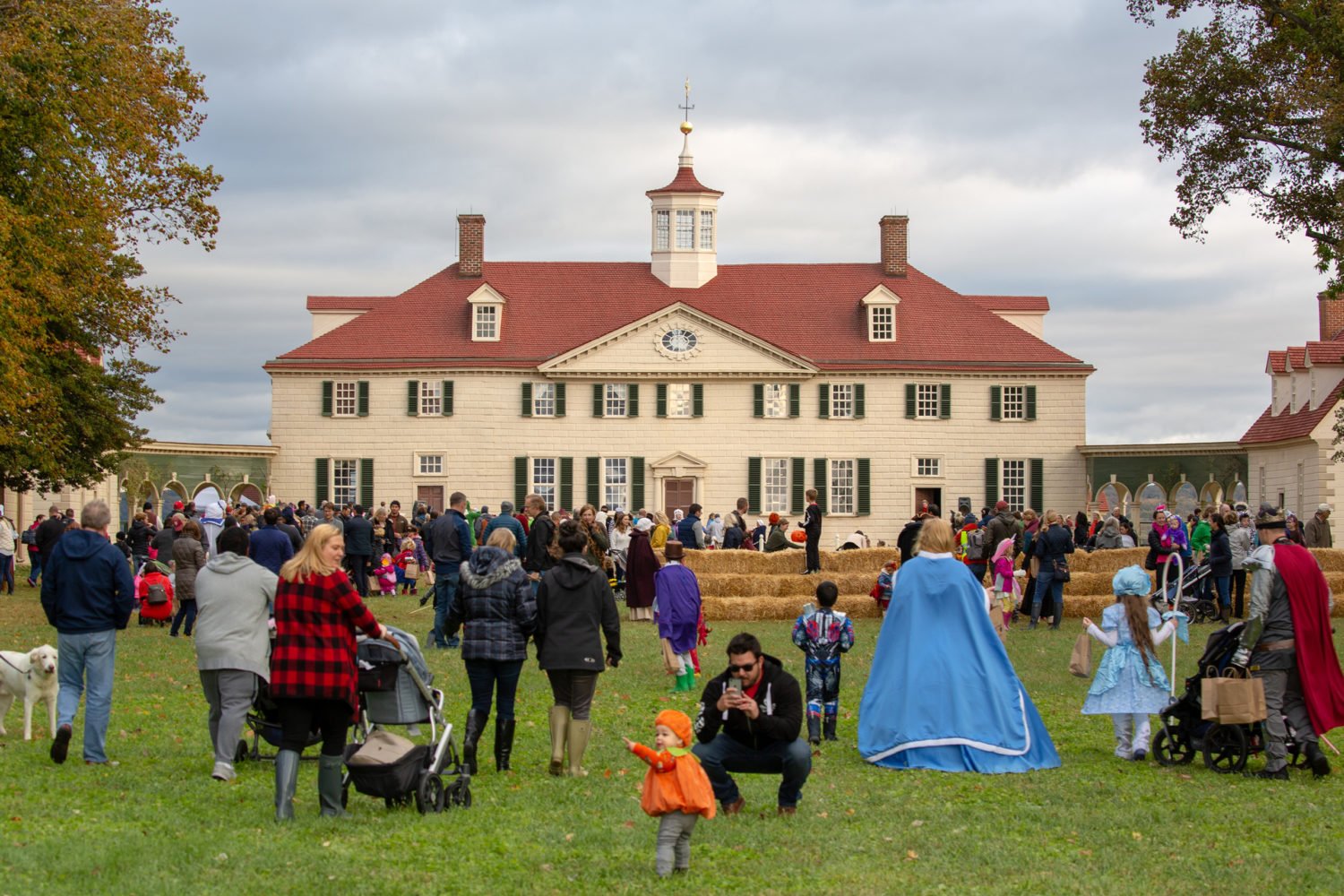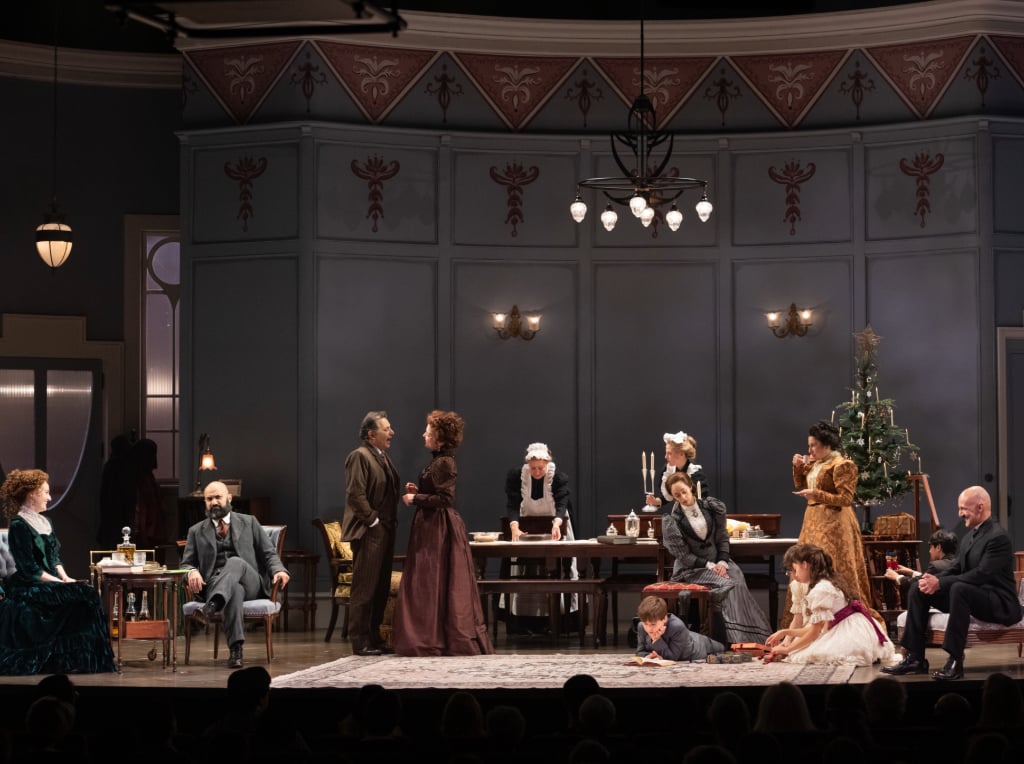Lady Reveller and friends gamble the night away in The Gaming Table, on stage at Folger Theatre. Photograph by Carol Pratt.
It was only seven years before playwright Susanna Centlivre was born that women were allowed to take the English stage, and it would only be another 300 or so before local director Eleanor Holdridge and an all-women design team would help introduce Washington audiences to the most popular female comedic playwright of the 18th century.
The little-known dramatist’s work comes to life this week as The Gaming Table begins its run at the Folger Theatre. Stacking its deck with commanding women onstage and, in this production, off, Centlivre’s 1705 comedy centers on a young widow and the colorful cast of characters and courtiers who populate her home nightly to play basset, a high-stakes card game (the play’s original title was The Basset Table). Couples spar and tangle with the requisite witty prose, madcap antics, and complex plots of the Restoration genre, Holdridge says, but after nearly 20 years directing plays from this period, it was Centlivre’s attitude toward her female characters that made Holdridge really take notice.
“I’m hoping that there can be a lot of buzz about Susanna Centlivre because she’s so dynamic,” the director says. “In this play, it’s so obvious that she cares so much about [the female characters] retaining their independence and continuing to be strong women.”
For Holdridge, continuing that same kind of “woman power” with an all-female design crew made sense. “If we came across a [situation] where the best person for the job didn’t turn out to be the first-choice female designer we wanted, we would have done that,” she says. “But it actually worked out, and we have this incredible team of women working on the play.”
Dramatic period costumes for the show were designed by Jessica Ford; Marion Williams found inspiration in casinos’ labyrinth-like designs for her dizzying set; Nancy Schertler served as lighting designer; Veronika Vorel handles sound. David Grimm, one of a handful of men working on the production, was tasked with replacing Centlivre’s original timely prologue and epilogue with prose that would be easier for modern audiences to understand. The bulk of the show’s action, however, shouldn’t be hard for today’s theatergoers to relate to, Holdridge says.
“What I love is that [Centlivre] is actually trying to create a world on page with all these different couples, where the women can get what they want and still have their man at the same time. Who doesn’t want that?” she says. “How do I have a career and find the guy I love at the same time? . . . That seems very contemporary to me. I don’t think we’ve come so far that we don’t have those doubts.”
With an annual three-play season devoted to Shakespeare and other classics, the Folger’s repertoire tends to skew toward male writers—a fact that made this project especially attractive to set designer Williams: “I think it’s exciting to do a female playwright there because there simply aren’t that many in what the Folger does.”
And it doesn’t stop there: In conjunction with The Gaming Table, Centlivre and other women who found success writing in Shakespeare’s time and the centuries soon afterward—if not the enduring fame of their male contemporaries—will be featured in “Shakespeare’s Sisters: Voices of English and European Women Writers, 1500–1700,” an exhibition running February 3 through May 20 in the Folger Great Hall.
“To get the history . . . by looking at the original piece of The Basset Table script and then seeing The Gaming Table, seeing these living, breathing people living out these crazy lives with very real wants and needs—I feel like it’s a connection throughout the pages of history that’s really amazing,” Holdridge says.
While they’ve been wrapping up rehearsals in recent weeks, the cast and crew have tried their hands at basset, and if it hadn’t been for self-imposed rules prohibiting the kinds of high-stakes bets and intense imbibing the play’s characters partake in, Holdridge notes, laughing, things might have gotten rowdier at their own table. As for the play, Holdridge is grateful for the hand she’s been dealt.
“There is risk involved in putting this production on, but I’m really glad I took it,” she says. “It’s a woman’s play that most people haven’t heard of. I barely knew about [Centlivre] when I read the play, so I think it is a risk, and I think it’ll really pay off.”
The Gaming Table is playing at the Folger Theatre through March 4. Tickets ($30 to $65) are available through the Folger’s website.















